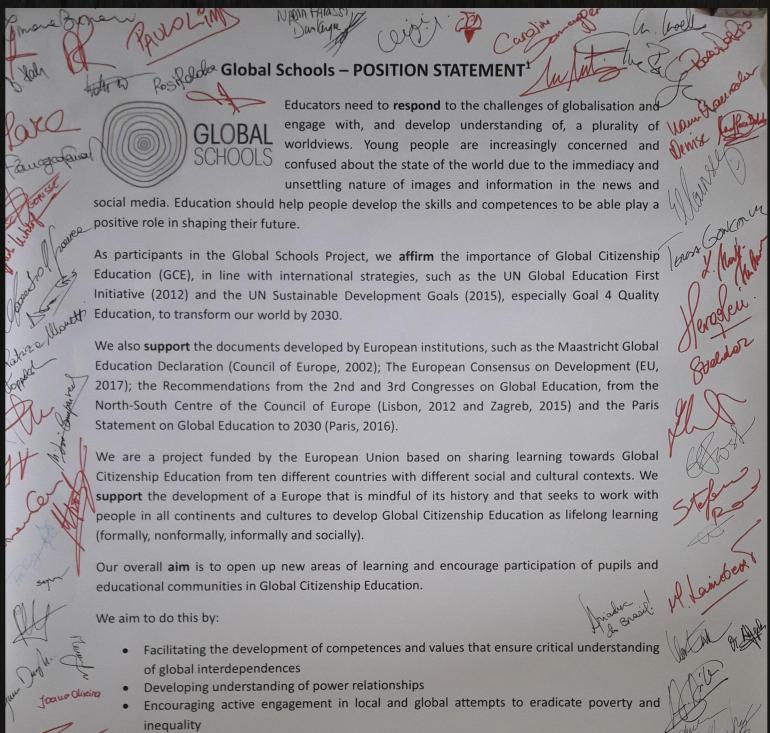
The Global Schools partnership undersigned a position statement on Global Citizenship Education urging policy makers and educators alike to focus on "values formation". To raise a new generation of world citizens motivated by solidarity, equality, justice, inclusion, sustainability and cooperation
Global Schools – TRENTO POSITION STATEMENT*
Educators need to respond to the challenges of globalisation and engage with, and develop understanding of, a plurality of worldviews. Young people are increasingly concerned and confused about the state of the world due to the immediacy and unsettling nature of images and information in the news and social media. Education should help people develop the skills and competences to be able play a positive role in shaping their future.
As participants in the Global Schools Project, we affirm the importance of Global Citizenship Education (GCE), in line with international strategies, such as the UN Global Education First Initiative (2012) and the UN Sustainable Development Goals (2015), especially Goal 4 Quality Education, to transform our world by 2030. We also support the documents developed by European institutions, such as the Maastricht Global Education Declaration (Council of Europe, 2002); The European Consensus on Development (EU, 2017); the Recommendations from the 2nd and 3rd Congresses on Global Education, from the North-South Centre of the Council of Europe (Lisbon, 2012 and Zagreb, 2015) and the Paris Statement on Global Education to 2030 (Paris, 2016).
We are a project funded by the European Union based on sharing learning towards Global Citizenship Education from 10 different countries with different social and cultural contexts. We support the development of a Europe that is mindful of its history and that seeks to work with people in all continents and cultures to develop Global Citizenship Education as lifelong learning (formally, nonformally, informally and socially).
Our overall aim is to open up new areas of learning and encourage participation of pupils and educational communities in Global Citizenship Education. We aim to do this by:
- Facilitating the development of competences and values that ensure critical understanding of global interdependences
- Developing understanding of power relationships
- Encouraging active engagement in local and global attempts to eradicate poverty and inequality
- Promoting justice, human rights and sustainable ways of living
- Fostering the resilience, creativity and optimism to take action, individually and collectively, for a just and sustainable world.
We encourage all educators to engage with and share learning from Global Citizenship Education shaped by the principles of values formation, critical thinking, dialogue and the exploration of interconnections.
We believe that school communities are spaces that can facilitate the emergence of a new generation of world citizens motivated by values of solidarity, equality, justice, inclusion, sustainability and cooperation.
* Drafted by the International Advisory Board (Dunkerque, 19 May 2017) as a working document and endorsed by the whole Global Schools partnership
